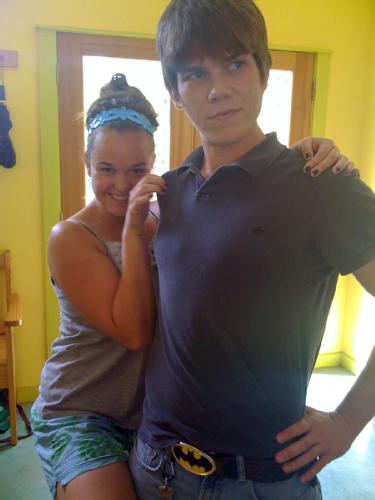My life is lived in multiples.
I’ve read books, articles, and blogs about multicultural marriage, living, and child-raising. I have written about being a third-culture kid, raising a bilingual child, and living and trying to work in a foreign country.
But this is the big question, more difficult than any of the above: how can a marriage survive being made up of two people whose careers are equally important to each?
If you have ever been part of a two-career couple, you know how hard it can be to find jobs that make both of you happy in the same location, especially (but not only) when that location is far from home for one or both of you. When a couple expatriates for one member’s job, the “following” spouse may not even be allowed to work, depending on the working spouse’s visa in the foreign country.
When you follow a foreign spouse to settle in his or her country, there probably won’t be legal obstacles to your working (you may take on the citizenship of your spouse, or you can usually get a work visa), but there are many other hurdles: language, culture, job market, and your own feelings about who you are and what you want to do with your life.
When Enrico and I married in 1989, I gave up an interesting job just then getting off the ground (doing technical training in far-flung countries) in order to be with him in New Haven and give birth to our daughter. In retrospect, my “accidental” pregnancy was probably subconsciously designed to resolve our increasing conflict over my exotic (and from Enrico’s point of view, dangerous) travels: a baby was a reason we could both agree on for me to stay home.
And stay home I did: I was mostly a full-time mom for 18 months. I did not resent or regret this; indeed, one reason that I never had another child was that I would have wanted (and felt it fair) to do the same for any other child of mine, but, once I had got my career off the ground again, there was never a “right” time to take off 12-15 months.
Moving to Italy was, for many reasons, the obvious thing to do when we did it. Though Enrico, fresh out of a Yale PhD, could have landed a university position somewhere in the US, it would have been the usual long start to an American academic career: post-doc here, assistant position there, teach a lot, and pray for tenure.
The situation is very different in Italian universities: a ricercatore (researcher, the entry-level position) can stay in the same place as long as he or she desires, although (ideally) you eventually move up the ladder to become professore associato (associate professor) and then ordinario (full professor). Positions are few and promotion takes decades (and political savvy), but in the meantime you are guaranteed a stable, reasonably well-paid job in a single location. The teaching load is light, and Enrico can direct his own research as he pleases. Nice work if you can get it…
As for me, I didn’t have a strong desire to remain in the US, my putative homeland – I’d lived out of it as much as in it. I didn’t have a job to leave right then, nor was I established in any field. There was no strong reason for me not to move to Italy, and plenty in favor of doing so.
Enrico sought and won a university position in Italy, and to Milan we came.
I had no idea what work I might be able to do there (aside from the far-too-obvious: teach English), but I figured I’d figure something out, as I always had. In 26 years of being moved around the world mostly by others’ decisions, it had never occurred to me to express or even to have strong desires about the parameters of my own life. I simply responded as best I could to the situations in which I found myself.
It was mostly luck that I found a job in Milan; it took hard work and talent to develope that job into a career. But I was still in reactive mode: taking advantage of opportunities as they came my way, but not making any effort to create my own opportunities. It simply didn’t occur to me that I could.
The first proactive thing I did to influence my own future was the MBA (from the Open University, the world’s oldest distance-learning institution) that I began in 1999 and completed (with interruptions) in 2004. I had realized that I wanted a career in which I could really make a difference, and that an MBA was a basic requirement to thrive in the corporate world.
But it’s unlikely that I could have an important career in Italy. I work in high tech, and there’s not much original going on in high tech in Italy – not because there are no technical or entrepreneurial Italians, but because it’s so damned hard to do the American-style startup thing in Italy (which could be the topic of a long article in itself, but it would depress me too much to write it).
Many of the world’s large high-tech companies have Italian offices, but these usually concentrate on regional sales and support engineering. The things I’m good at are run mostly from US headquarters.
Twice during the Internet boom I tried to persuade Enrico that we should move to the US to let me pursue my career. The second time he agreed, reluctantly, to come with me for a year or two while I helped to launch Roxio, the software group being spun off from Adaptec in 2000-2001. For a number of reasons, that move was aborted, and I returned to Italy, beaten and frustrated, to the same distance-working situation in which I had previously felt so alienated and vulnerable. I quit after a few months, and would have been laid off soon thereafter in any case, as the bubble burst and the economic downturn began.
Fabrizio Caffarelli, my former boss at Incat Systems, is a rare example of a successful Italian high tech entrepreneur, and I was happy to join his new startup a few years later (as the consulting/tech writing gigs I’d had after leaving Roxio also dried up). I had high hopes for TVBLOB when it began, but four years in startup mode at a salary I could have equalled as a supermarket cashier… well, that got old, and personal circumstances conspired to force a change.
I began working for Sun Microsystems as a contractor in March of 2007; they hired me as a regular employee a year later, on the condition that I move to the US and work from an office.
I was ready to go. I had initially loved Sun’s willingness to let me, and many other employees, work from home. I still believe that this works very well for many people, especially those who have kids at home: workplace flexibility is a huge help in achieving the much-prized “work-life balance.”
But the year I had spent as a mostly long-distance contractor reminded me of all the problems I had experienced before, as a very long-distance employee of Adaptec. It’s hard to schedule meetings when you’re eight or nine time zones away from most of your colleagues; you end up having them late at night in Europe – not my best time of day, I’m a morning person. And when you can be neither seen nor heard by your colleagues… well, out of sight, out of mind, out of the decision-making loop – and, eventually, out of a job.
Conclusion: if I want a challenging job, I need to be in the US (or, at least, not in Italy). So here I am, with a job that I enjoy very much both for its current realities and its future possibilities.
But my life here so far is mostly about my job. So much for work-life balance (said she ruefully). It appears that I can have work or have a life, but not both. At any rate, I can’t have a regular home life with my husband, because his job is there, and mine is here, and there doesn’t seem to be any way to make the two meet.
And I don’t have an answer to that one.
Update, 2014: Enrico and I never did find a solution. We separated in 2009 and are now divorced.
Update, 2017: I have since found someone with whom I happily share both the personal and professional sides of me.








